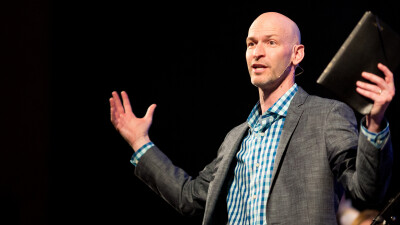Did you know that mental health experts estimate that 1 in 5 college students struggle with anxiety or depression?[1] In a recent Time magazine article, Katie Reilly reported that in 2017 40% of college students in the US had experienced depression that made it hard to function in the last year. She went on to say that 61% had felt overwhelming anxiety at some point.[2]
While I am sobered by these numbers, I am not surprised. Even as I write this I am managing several situations that involve students who have had to be hospitalized for mental health related issues. Depression and anxiety are among the most frequently reported issues that our staff are facing among the students they are working with.
Adding to the complexity of the issue, people who wrestle with mental health issues can often feel stigmatized and shamed which leads to a reluctance to talk about it. This fuels the sense of isolation, giving the problem fertile ground in which to grow and making it harder to identify and deal with.
The good news is that one of the most important factors in overcoming mental health challenges is relationships characterized by love, acceptance, and shared experience. It’s true! In the words of Christian author and psychologist Henry Cloud, people are God’s “plan A” for healing, growth, and development.[3] Cloud goes on to relate that interpersonal connections are central to maintaining mental health and that almost every psychological malady has “alienation or emotional isolation at its core, or close to it”[4]. Relationships are clearly more than just a good idea, rather they are necessary for our spiritual and emotional well-being.
This reality has many implications for all of us as ambassadors of Christ. As we engage in meaningful, committed relationships with others, we can trust that God is at work. His word tells us as much: “ From [God] the whole body, joined and held together by every supporting ligament, grows and builds itself up in love, as each part does its work“ (Eph. 4:16).
This vision of Christian community can radically change the way we approach our engagement with the Eagle church community. It points to the idea that we all play a role in each other’s wellbeing and that, in the context of love, God uses us to build us up.
This has certainly been true for our family. In the Fall of 2007, our family relocated to Indiana from southern-central Idaho, leaving behind all of our extended family. If you have never experienced a move like this, it can be a very lonely experience. People that know your history and with whom you have life-long connections are suddenly not part of your everyday life. However, in 2008, we started attending Eagle Church and, in many ways, the Eagle community became our main source of relational connection. Since then Eagle has supported us through difficult times, encouraged us in our ministry with CRU, and given us a place to serve, worship, and belong. Many of our closest friends and fondest memories are from Eagle and many of the best things about our life can be traced back to Eagle.
When you consider that the purpose of our church community is to allow us to grow and build each other up in love, the vision of More. Together. Every Day becomes much easier to own. In fact, you might even internalize it as a desire rather than a lofty goal: Who doesn’t want to be built up?
I want to leave you with a little experiment. This Sunday, as you are coming to church, I want you to ask the Lord to show you two things. First, ask God to show you who you can build up within our community and how to do it (keep in mind, it doesn’t have to be a huge thing). Second, ask God to show you what you need from someone today. The second thing may well be the harder than the first because we live in a self-sufficient culture. However, we all have needs. When we ask for what we need, it makes connection possible; it actually draws people closer because it makes us vulnerable and it provides others with the opportunity to build into the community.
[1] David Rosenberg. The Conversation: Academic rigor, journalistic flair. February 9, 2018.
[2] Katie Riley. Record numbers of college students are seeking treatment for depression and anxiety-but schools can’t keep up. Time magazine, March 19, 2018.
[3] Henry Cloud & John Townsend. How people grow: What the Bible reveals about personal growth. Grand Rapids, MI: Zondervan.
[4] IBID
